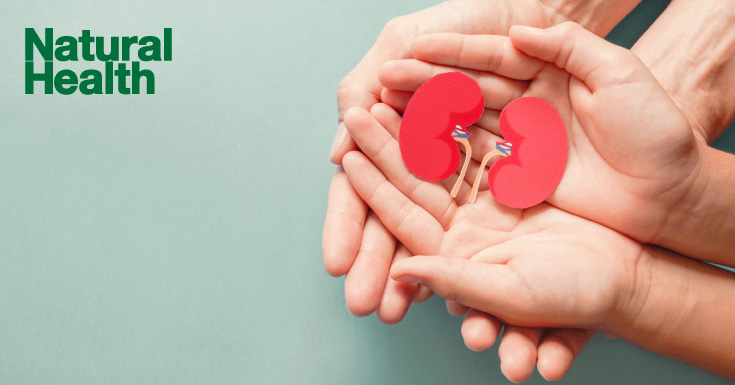WHAT IS SO IMPORTANT ABOUT KIDNEYS THAT YOU MUST KEEP THEM HEALTHY?
Kidneys regulate water for your body to work well. It must contain just the right amount of water. One of the vital jobs of the kidneys is to remove excess water from the body or to retain water when the body needs more.
Kidneys help to balance the body’s minerals. Many substances in the blood and other body fluids must be kept at the correct level for the body to function correctly. For example, sodium (salt) and potassium are minerals that come from food, are essential for good health, and must be at certain normal levels. When the kidneys work correctly, extra minerals, such as sodium and potassium, leave your body in the urine. The kidneys also regulate other minerals, such as calcium and phosphate (necessary for bone strength, growth, and other functions).
Kidneys remove waste products from your body, like urea and creatinine. While meat is broken down into urea and other wastes, creatinine is a waste product of the muscles. As kidney function decreases, urea and creatinine in the blood increase. The creatinine level in the blood is a useful measure of kidney function and is measured by a simple blood test.
Kidneys produce hormones. Normal kidneys also make essential chemicals in your body called hormones. These hormones circulate in the bloodstream like “messengers” and regulate blood pressure, red blood cell production, and the calcium balance in your body.
WHAT ADVICE OR TIPS SHOULD A PERSON FOLLOW TO KEEP KIDNEYS HEALTHY?
- Drink Water
Proper hydration is vital to kidney health. When the body doesn’t get enough water, the kidneys get dry, causing them to absorb toxins rather than expel them. Insufficient hydration causes water retention because the kidneys cannot remove the liquids they usually would. Doctors recommend drinking between six to eight glasses of water daily. However, remember that daily intake may need to be increased in conditions like hot weather or when performing strenuous physical activities. - Put Down the Salt
This seasoning is at the top of the list of foods to avoid with kidney disease. Salt is added to processed foods, and many people pick up a fork when shaking salt onto every item on their plate. Keeping sodium intake to less than 2,300 milligrams daily is a great way to improve kidney health. - Exercise
Running a marathon or becoming a Crossfit champion isn’t necessary to enhance kidney function. Simply taking an after-dinner walk is a sensible start to being more active. Look for ways to increase movement every day. As it becomes more natural to be mobile, consider trying more strenuous workouts. Riding a bike, swimming, dancing, and yoga are all wonderful for kidney health. - Quit Smoking
It’s impossible to overstate how crucial giving up tobacco is to promote healthier kidneys. Smoking impairs blood flow to all organs and may interfere with the efficacy of blood pressure medications. Kicking the habit may not be easy, but it is the healthiest choice for everyone. - Cut Back on Alcohol
It’s best to refrain from alcohol except on special occasions. People who want to drink more often are advised to restrict intake to one drink a day for women and one to two drinks a day for men. - See Your Doctor
Routine medical appointments give your doctor a chance to perform potentially life-saving screenings. Pay attention to annual check-ups and be vigilant about additional appointments if your kidney disease risk factors are high. - Monitor Sugar Intake
People with diabetes are highly likely to develop kidney disease and are recommended to limit their consumption of sweets, sodas, and alcohol. - Keep A Tab on Blood Pressure
Consistently high blood pressure causes the kidneys to work overtime. Monitor blood pressure regularly, and stick to any recommended medications prescribed by a doctor. - Choose a Healthy Diet
Select lean proteins and plenty of fresh fruit and vegetables for most meals. Consuming green, leafy vegetables keeps body weight in check while providing critical nutrients that every system in the body requires for optimal functionality. - Limit NSAIDs
Regularly taking ibuprofen, naproxen, and similar over-the-counter pain relief remedies strain the kidneys. Ask a doctor about healthier alternatives for everyday pain management
WHAT ARE THE SIGNS OF HEALTHY KIDNEYS?
- No Changes in the Frequency of Urination
One of the early signs of kidney disease is having to urinate more often. This is because damaged kidneys can cause one to feel the urgent need to urinate, even if they just went. Therefore, if you have not been experiencing an increased frequency of having to urinate, especially at night, then you likely have healthy kidneys. Consistency is a good sign, so keep an eye out for changes to your daily urination habits. - Healthy Urine
Healthy urine is directly related to healthy kidneys. Healthy urine is based on color, consistency, and frequency. When kidney damage occurs, changes to the urine can include a consistent foamy or blood in the urine. Therefore, if you or a loved one starts experiencing these symptoms, it is crucial to seek a kidney specialist immediately. Again, consistency is critical, so make sure to stay aware of any changes in the color of your urine. The darker the color becomes, the more necessary it is to talk with your doctor about the possible reasons. - Proper Sleeping Patterns
Another sign of healthy kidneys is proper sleeping habits. Since kidneys can directly impact sleeping habits, one of the first things kidney damage affects is sleep quality. This is because healthy kidneys filter out toxins and impurities through the urine, and when they can longer do that, it can impact your sleep quality. In addition to lack of quality sleep, unhealthy kidneys have also been linked to other sleeping issues, like sleep apnea. Many reasons, like stress, anxiety, and other outside factors, can cause your sleep to be disrupted. Still, if you consistently have trouble sleeping for no logical reason, your kidneys could be to blame. Be sure to look at the other signs and see if a pattern is forming that points towards kidney disease. - No Signs of Puffiness or Swelling
When your kidneys are not properly functioning, they can severely impact your look. Although you may not feel damage to your kidneys happening, you will notice that areas of your body will become puffy or swollen. Mainly, it would help if you looked out for puffiness in your eyes and swelling in your lower body. A malfunctioning kidney can leak protein into your urine and cause your body to retain more sodium. - No Muscle Cramping
While occasional muscle cramping is common, frequent muscle cramping can be a sign of damaged kidneys. This is caused by electrolyte imbalances that lead to issues such as low calcium levels. Your kidneys play a vital role in keeping your body free from toxins; without it, you will feel the physical side effects. These side effects can be aesthetic, such as puffiness and swelling, or they can be internal, like muscle cramping. Ensuring you have a healthy kidney will make the rest of your body function properly and help you be productive and efficient. - Your Skin is Clear and Healthy
The kidney function impacts a lot of other areas of the body. Those with kidney disease may have dry or itchy skin due to the inability of their blood to have the proper nutrition and minerals. If your skin is clear, then that is a good sign you have a healthy kidney.
Key Renal Malaysia’s statistics:
Malaysia is the Second-Fastest Rising Kidney Failures Globally.
Malaysia reported a 13 percent annual increase in treated kidney failure cases in the last decade, the second-highest rise in the incidence rate worldwide.
According to the United States Renal Data System annual data report for 2018, the incidence rate of treated end-stage renal disease (ESRD) in Malaysia rose an average of 13.2 percent per year from 2003 to 2016, the second country in the list to record a high increase, after Thailand at 19.4 percent.

Malaysia with highest Diabetes Mellitus related End Stage Renal Disease globally.

The most significant average yearly increase in diabetes related ESRD incidence rates from 2003 to 2016 also occurred in Malaysia and Jalisco, where incidence rates of treated ESRD due to diabetes increased an average of 9.5 and 7.8 patients per million general population (PMP) per year, respectively, over the 14 years.
The Malaysian Dialysis and Transplant Registry reported that 8,431 new patients received dialysis in 2018; by the end of 2018, there were 44,136 patients on dialysis. End-stage kidney disease (ESKD) patients are estimated to reach 106,000 in 2040.
 Dr T. Kalaiselvam Thevandran
Dr T. Kalaiselvam Thevandran
Consultant Internal Medicine Physician & Nephrologist
Columbia Asia Hospital – Klang


